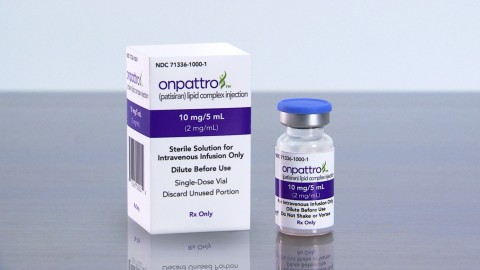Alnylam’s faith in the gene-silencing potential of RNA interference (RNAi) drugs has finally paid off, with the US approval of its patisiran candidate for rare disease hereditary ATTR amyloidosis.
It’s a payback for two decades of scientific endeavour and a big step forward for the 50,000 hATTR amyloidosis patients worldwide, but is also tipped to be a big commercial success for Alnylam.
Analysts are predicting $1bn-plus in sales for its first commercial RNAi drug, which will be sold in the US as Onpattro and is also on the verge of approval in Europe after getting a positive opinion from the EMA’s Committee for Medicinal Products for Human Use (CHMP) last month.
The high predictions stem in part from its list price of $450,000 per patient per year, which is fairly typical for rare disease therapies. Alnylam is however modelling an average $345,000 annual cost after discounts, and is also offering a money back guarantee for insurers in the form of a rebate if patisiran doesn’t work as expected – which is being hailed as a first for a rare disease drug.

Healthcare payers have applauded Alnylam for linking reimbursement to patient outcomes, with Express Scripts saying that the move is “a responsible approach to pricing and patient access in the rare disease space, [which is] an increasingly complicated challenge.”
RNAi drugs are used to block gene expression, binding to the messenger RNA that corresponds to a defective gene and switching off protein production. It’s been 20 years since Andrew Fire and Craig Mello published the unifying paper in the field that led to them winning the Nobel prize eight years later.
In the case of hATTR amyloidosis, patisiran switches off the activity of the TTR gene, which leads to the clumping of misfolded protein into amyloid deposits and widespread tissue and organ damage that typically proves fatal within two to 15 years of diagnosis. The FDA has approved Alnylam’s drug specifically to treat nerve damage (polyneuropathy) in hATTR amyloidosis patients.
In the phase III APOLLO study, patients given an intravenous injection of patisiran every three weeks for 18 months showed slight improvements in nerve function measures such as motor strength, reflexes, sensation, nerve conduction and postural blood pressure, while patients on placebo saw a decline over the period.
At the moment treatment options for hATTR amyloidosis include liver transplant and off-label non-steroidal anti-inflammatory drugs but these do little to address the progressive peripheral nerve damage that characterises the disease.

John Maraganore has led Alnylam since 2002
Alnylam’s chief executive – John Maraganore – estimates that there are around 3,000 patients in the US eligible for treatment with patisiran. The company is expecting to start shipping the drug within the next couple of days.
Patisiran is the first FDA-approved drug for hATTR amyloidosis in the US, but will only claim third place in Europe after Akcea/Ionis’ antisense oligonucleotide rival Tegsedi (inotersen), which was approved for that indication by the EMA in July and Pfizer’s Vyndaqel (tafamidis) which has been on the market since 2011 but was rejected by the FDA in 2012.
Tegsedi is due for a verdict from the FDA by 6 October, while Vyndaqel remains in trials in the US for transthyretin cardiomyopathy, another TTR amyloidosis symptom, and could be on the market next year.
Maraganore said the approval puts Alnylam on course to be a “fully integrated, multi-product biopharmaceutical company with a sustainable pipeline” by 2020.




